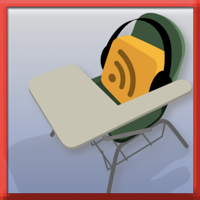1st Graders Create Their Own Read-Along Audio Book
Sometimes we doubt the ability of younger children. We may say that they are to young to read, they will not listen to directions, or organizing a fun activity is a nightmare. Ms. Silvia Rosenthal Tolisano had different thoughts on what younger children can do. She took a group of first graders, yes first graders, and allowed them to do a podcast. Allowing these children to experience with podcasting not only shows them how great technology is, but allows them to practice their reading, grammar, and listening skills in a FUN way. After reading and listening to Listening-Comprehension-Podcasting, also provided by Ms. Tolisano, I realized that not only does podcasting allow students to practice their reading and grammar skills, but it also allows them to transfer into "different characters" so to speak. These children did an entire podcast in the Hebrew language. After recording their parts, the children had to organize each recorded part so they story would flow right. This ensured the teacher that the students comprehended the story. If you listen to it you will hear how much they thoroughly enjoyed it.
After listening and reading each of these post I realized how important and neat podcasting is. Children can spruce up their fluency, comprehension, enthusiasm of reading, and listening skills in one simple activity.
Why Podcast in the Classroom?
Mr. Saunders states in his video, The Benefits of Podcasting in the Classroom, podcasting is very important in the classroom. Podcasting allows a teacher to record the class lecture and students can review it on their class blog to help them study for test. If students are out sick they can watch these podcast and never miss a day of class. A literature teacher and his fellow co-workers podcasted a story for students to listen to. This allowed students to enjoy the piece, because emotions were added and it made the story more interesting. Podcasting has several benefits in the classroom. It benefits absentees, students who do not like reading, or students who want to act.
I found several techniques I would like to use for my own podcast. Adding emotions and a differentiation of voices adds character to the podcast. Once I land a teaching job, I will coordinate podcasting into my classroom. It adds another dimension in the learning environment.


Good job.
ReplyDeleteYou have pictures as well as distinct headings and links. Great job!
ReplyDelete"Allowing these children to experience with podcasting not only shows them how great technology is, but allows them to practice their reading, grammar, and listening skills in a FUN way." Yes! I think children learn the best by doing. In this case, they are able to enjoy their activity and learn as well. I wish I would have had an opportunity like this when I was in elementary school. It seemed like we only ever used computers for typing up papers or other assignments. Therefore, computers had a negative connotation attached to them for many of the students.
"After recording their parts, the children had to organize each recorded part so they story would flow right." I think you meant "the" not "they". Small errors like this can be fixed easily by just rereading over your post before you publish it.
"Adding emotions and a differentiation of voices adds character to the podcast." You are right about this. One thing I cannot stand is to listen to someone speak monotone with no expression or no change of volume. Adding emotions not only adds character, it also adds enthusiasm about what you are doing. If you are reading with no emotion, it makes everyone listening think that you don't care one bit about what you are doing. It is just boring.
Great job! I enjoyed reading your post!